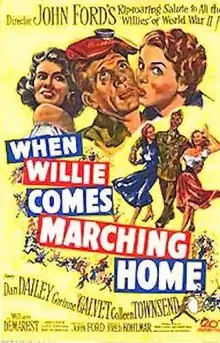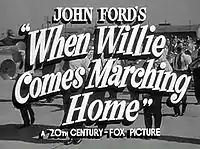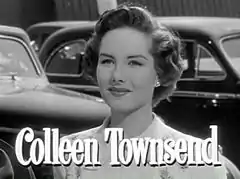When Willie Comes Marching Home
When Willie Comes Marching Home is a 1950 World War II comedy film directed by John Ford and starring Dan Dailey and Corinne Calvet. It is based on the 1945 short story "When Leo Comes Marching Home" by Sy Gomberg. The film won the Golden Leopard at the Locarno International Film Festival.[3]
| When Willie Comes Marching Home | |
|---|---|
 1950 Theatrical Poster | |
| Directed by | John Ford |
| Produced by | Fred Kohlmar |
| Written by | Richard Sale Mary Loos |
| Story by | Sy Gomberg |
| Starring | Dan Dailey Corinne Calvet Colleen Townsend William Demarest |
| Music by | Alfred Newman |
| Cinematography | Leo Tover |
| Edited by | James B. Clark |
Production company | |
| Distributed by | 20th Century Fox |
Release date |
|
Running time | 82 minutes |
| Country | United States |
| Language | English |
| Box office | $1,750,000[1][2] |

Sy Gomberg also received an Oscar nomination for Best Motion Picture Story at the 23rd Academy Awards in 1951 but was edged out for the award by Edna Anhalt and Edward Anhalt for Panic in the Streets.
Plot
William "Bill" Kluggs (Dan Dailey) is the first in his hometown of Punxsatawney, West Virginia, to enlist in the Army Air Forces after the attack on Pearl Harbor, making his father Herman (William Demarest), mother Gertrude (Evelyn Varden) and girlfriend Marge Fettles (Colleen Townsend) proud. The whole town sees him off. Willie tries to become a pilot but washes out, although he proves to be so proficient at aerial gunnery that, rather than being sent to Europe to fight, he is made an instructor and assigned to a base near his hometown. After two years in the same place, he is branded a coward by the townsfolk, even though he continually requests a transfer into combat.
He finally gets his chance when a gunner on a B-17 Flying Fortress bomber gets sick and Bill is allowed to take his place. The plane takes off for England, but owing to fog, is unable to land and runs low on fuel. The crew is ordered to bail out, but Bill is asleep and does not parachute out of the plane until it is over German-occupied France.
He is captured immediately by the local French Resistance unit, led by the beautiful Yvonne (Corinne Calvet). While there, he sees a secret German rocket launch, which is filmed by the French. He and the film are picked up by a British torpedo boat and taken to England. There, he passes the vital information and his eyewitness confirmation on to a series of important generals, first in London and then in Washington, D.C..
During the time he is in the bomber, France, England, and Washington, he is continuously wakened when he tries to sleep, and plied with liquor as a pick-me-up or to settle motion sickness. Bill finally collapses, exhausted. He is sent to a hospital to recuperate, under strict orders not to reveal what he has done, where a doctor mistakenly puts him into a psychopath ward. When the hospital attendants believe he is crazy and try to put him in a straitjacket, Willie escapes and heads home on a freight train.
Back home, because only four days have elapsed since he left Punxatawney, his parents and girlfriend don't believe his story either. Officers from the Pentagon arrive to return him to Washington to be decorated personally by the President of the United States.
Cast
 | Dan Dailey as William "Bill" Kluggs |
 | Corinne Calvet as Yvonne |
 | Colleen Townsend as Marge Fettles |
 | William Demarest as Herman Kluggs |
- Jimmy Lydon as Charles "Charlie" Fettles
- Lloyd Corrigan as Major Adams
- Evelyn Varden as Mrs. Gertrude Kluggs
Mae Marsh, formerly a successful silent-era actress appears in an unbilled role. Alan Hale Jr. and Vera Miles also appear in unbilled roles, early in their respective careers.
Hollywood precision pilot Paul Mantz performed the crash stunt in which a PT-13D Stearman shears off its wings crashing between two oak trees.[4]
References
- "Top Grosses of 1950". Variety. January 3, 1951. p. 58.
- Aubrey Solomon, Twentieth Century-Fox: A Corporate and Financial History Rowman & Littlefield, 2002 p 223
- "Winners of the Golden Leopard". Locarno. Retrieved 2012-08-12.
- Editors, Air Classics, Challenge Publications, Canoga Park, California, July 1972, Volume 8, Number 8, page 39.
External links
| Wikimedia Commons has media related to When Willie Comes Marching Home. |